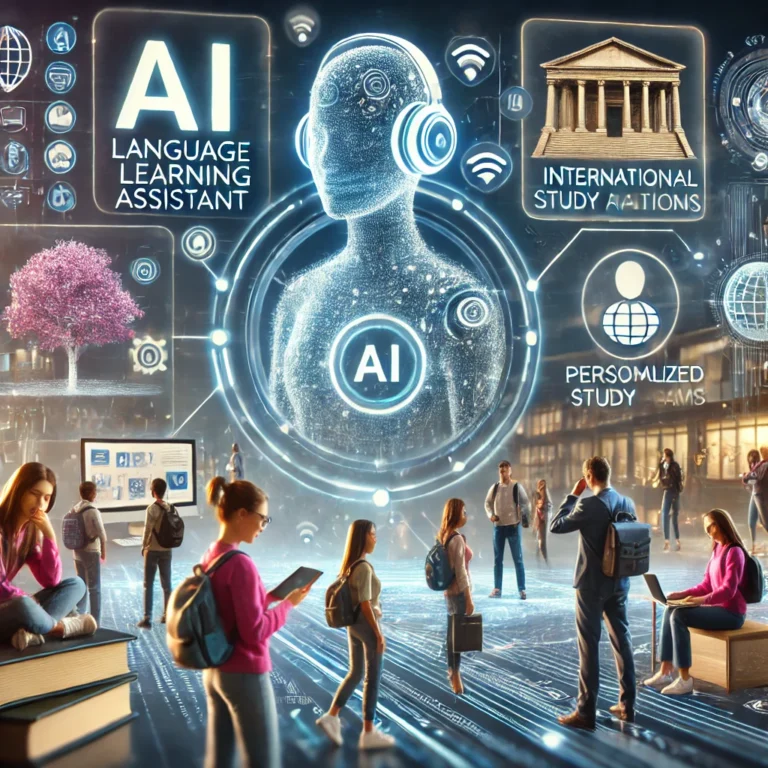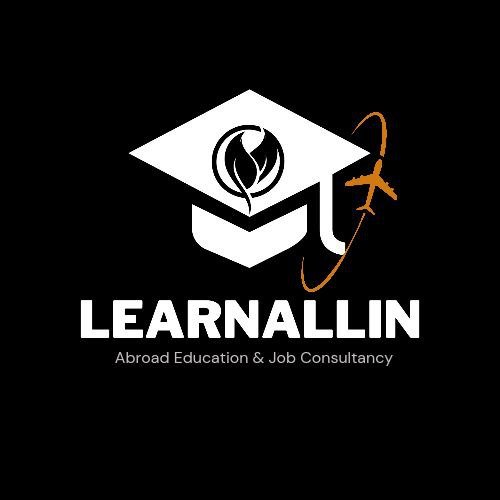The Role of AI in International Education: How Technology is Shaping the Future of Study Abroad
Redefining Boundaries with AI in Education
The world of education is undergoing a revolutionary change, and Artificial Intelligence (AI) is at the forefront of this transformation. As international education evolves, AI and technological advancements are influencing everything from language learning to virtual campus tours. For students considering studying abroad, these innovations open up a new world of possibilities, making the experience more personalized, accessible, and enriching. studying abroad more accessible and personalized than ever.

AI-Powered Language Learning: Breaking Down Language Barriers
One of the biggest challenges international students face is mastering a foreign language. Traditional methods of language learning, such as classroom instruction or textbook study, often fall short in providing the immersive experience needed for fluency. This is where AI comes into play.
1. Real-Time Language Translation and Practice
AI-driven tools like Duolingo, Babbel, and Rosetta Stone use machine learning algorithms to tailor language lessons according to the learner’s pace and ability. With features such as speech recognition and real-time feedback, these tools mimic real-life interactions and help students practice pronunciation and grammar in a way that feels natural. Additionally, AI-powered translators like Google Translate and Microsoft Translator are continually evolving, providing more accurate and context-specific translations that help students communicate effectively in different languages.
2. Personalized Learning Paths
AI offers personalized learning paths by assessing each student’s progress and adjusting lessons accordingly. This adaptive learning approach ensures that students focus on their weak areas, thereby speeding up the language acquisition process. With AI, students no longer have to navigate a one-size-fits-all curriculum; instead, they receive a tailored education that matches their learning style.
Virtual Reality (VR) Campus Tours: Experience Your Future Campus from Home
Choosing the right university can be daunting, especially when considering options overseas. Students often rely on brochures, websites, and second-hand information, which may not fully capture the campus experience. Virtual Reality (VR) technology changes that by allowing students to explore campuses from the comfort of their homes.
1. Immersive Campus Exploration
With VR campus tours, students can virtually “walk” through university grounds, explore classrooms, libraries, and dormitories, and even interact with virtual students and staff. This immersive experience provides a realistic sense of what it’s like to study there, helping students make more informed decisions. Universities like Stanford, Harvard, and MIT already offer VR tours, providing a new dimension to the selection process.
2. Reducing Cultural and Social Anxieties
For many international students, adjusting to a new culture and social environment can be stressful. VR campus tours allow students to familiarize themselves with their surroundings before they even set foot on campus. This pre-immersion helps reduce cultural shock and social anxiety, making the transition smoother and less intimidating.
AI-Driven Personalized Study Programs: Tailoring Education to Individual Needs
The concept of personalized learning has gained significant traction in recent years, thanks to AI. Instead of following a fixed curriculum, students can now benefit from study programs that adapt to their individual needs and goals.
1. Intelligent Tutoring Systems (ITS)
AI-powered Intelligent Tutoring Systems (ITS) are revolutionizing the way students learn. These systems use data analytics to monitor a student’s progress and provide customized feedback and resources. For example, platforms like Carnegie Learning and Knewton offer personalized tutoring services that adapt to each student’s pace, learning style, and knowledge gaps. This results in a more engaging and effective learning experience.
2. Data-Driven Academic Advising
AI also plays a crucial role in academic advising. Traditional advising can be limited by human resources and may not always provide comprehensive guidance. AI-driven platforms, such as IBM Watson and Degree Compass, analyze vast amounts of data to recommend courses, majors, and career paths that align with a student’s interests and strengths. This data-driven approach ensures that students make informed decisions about their education and career.
AI in Student Support and Wellbeing: Ensuring a Safe and Supportive Experience
The well-being of international students is a critical aspect that AI is helping to address. From mental health support to safety measures, AI is making the study abroad experience safer and more supportive.
1.Mental Health AI Bots
AI-driven mental health bots, like Woebot and Wysa, offer 24/7 mental health support, providing coping strategies, relaxation techniques, and professional counseling referrals. These bots use natural language processing (NLP) to engage in meaningful conversations, making them a valuable tool for students dealing with stress, anxiety, or homesickness.
2. Safety and Security
AI-based safety apps, such as bSafe and Noonlight, provide real-time safety alerts, location tracking, and emergency assistance. These tools are particularly valuable for international students unfamiliar with their new surroundings, ensuring a safer study abroad experience.
The Future of AI in International Education: What’s Next?
AI is just beginning to show its potential in international education. Future advancements may include:
- AI-Powered Learning Communities: Connecting students worldwide for collaborative learning.
- Blockchain Credentials: Securely verifying and sharing academic records.
- Enhanced Virtual Reality Experiences: Creating fully immersive learning environments.
The possibilities are endless, and AI will continue to shape the future of education, making it more inclusive, personalized, and accessible.
Embrace the Future of Education with Learnallin Abroad
As AI and technology continue to transform international education, students have more opportunities than ever to enhance their learning experiences. From personalized study programs to immersive VR tours and AI-driven language tools, the future of education is here.
Why Choose Learnallin Abroad?
At Learnallin Abroad, we are dedicated to helping you make the most of these technological advancements. We provide comprehensive support, from language learning and admissions to mental health resources and safety tools, ensuring your study abroad journey is smooth and successful. Explore new opportunities and redefine your educational experience with Learnallin Abroad.
